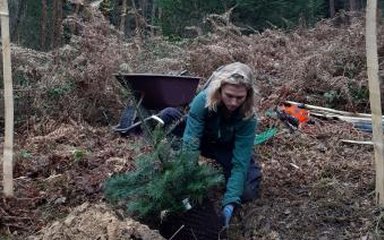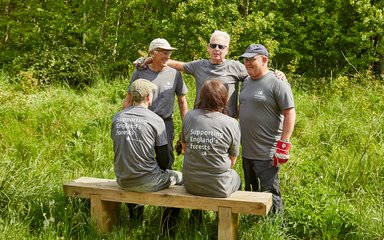
At Forestry England we have a number of ranger roles that specialise in different areas. For example: recreation, volunteering, education and community engagement. There are over 1,800 miles of walking, running and cycling trails, 19,000 volunteers, and many schools visits and family events on offer in the nation's forests.
Our rangers are part of the recreation team and play a key part in making sure visitors have a enjoyable, safe and memorable experience.
What it takes
A ranger’s role is often varied and involves a mixture of working outside and in the office. Working patterns vary and generally include working during the busy periods such as weekends and school holidays. The role may involve:
carrying out regular safety inspections on play structures, cycle trails, footpaths and trees.
undertaking basic maintenance tasks and keeping the forest tidy and safe for the visitors, which includes litter picking, emptying bins and toilet inspections.
co-ordinating volunteers on conservation tasks and community engagement projects.
working with schools to encourage learning about the forest environment.
taking the lead in preparing and delivering events like mountain biking and family sessions.
dealing with anti-social behaviour and emergency situations.
Skills and qualifications
We recommend that you gain experience and certificates where you can. The subject matter studied will vary depending upon the type of ranger role you would like to undertake. For example, an education ranger may complete teacher training or gain an early years qualification and a recreation ranger may specialise in land management. All ranger roles involve working directly with members of the public and require good communication skills.
Completing a relevant college course or apprenticeship and achieving appropriate certificates will provide you with a strong foundation. Volunteering and short term seasonal roles are great for gaining practical knowledge, experience and skills.
You can get into this job through:
a college course.
an apprenticeship.
seasonal ranger roles.
volunteering.
Forestry England's shadow volunteer and trainee programmes.
College
You could take a course at a college to learn some of the skills needed to be a ranger. Courses may include:
- environmental studies and conservation.
- countryside/land management including ecology.
- postgraduate certificate in education through teacher training.
Apprenticeships
Apprenticeships are a great way to learn while you earn. Discover more about apprenticeships at Forestry England.
Salary
Starting from £26,000.
Typical hours
37 - 44 hours per week, including weekend and evening work.
Forestry England offers flexible working patterns where appropriate and lots of other great benefits to support a healthy work/life balance.
How you can grow with us
Your career could progress into:
- forest work supervisors.
- management roles such as visitor experience, learning, volunteering or recreation.
- specialist roles on topics such as habitat restoration officer or delivering our Active Forest programme.
Applying to work at Forestry England
If a ranger's role sounds exciting to you, check out Civil Service jobs for all our current vacancies.
Our frequently asked questions will help in your application.




